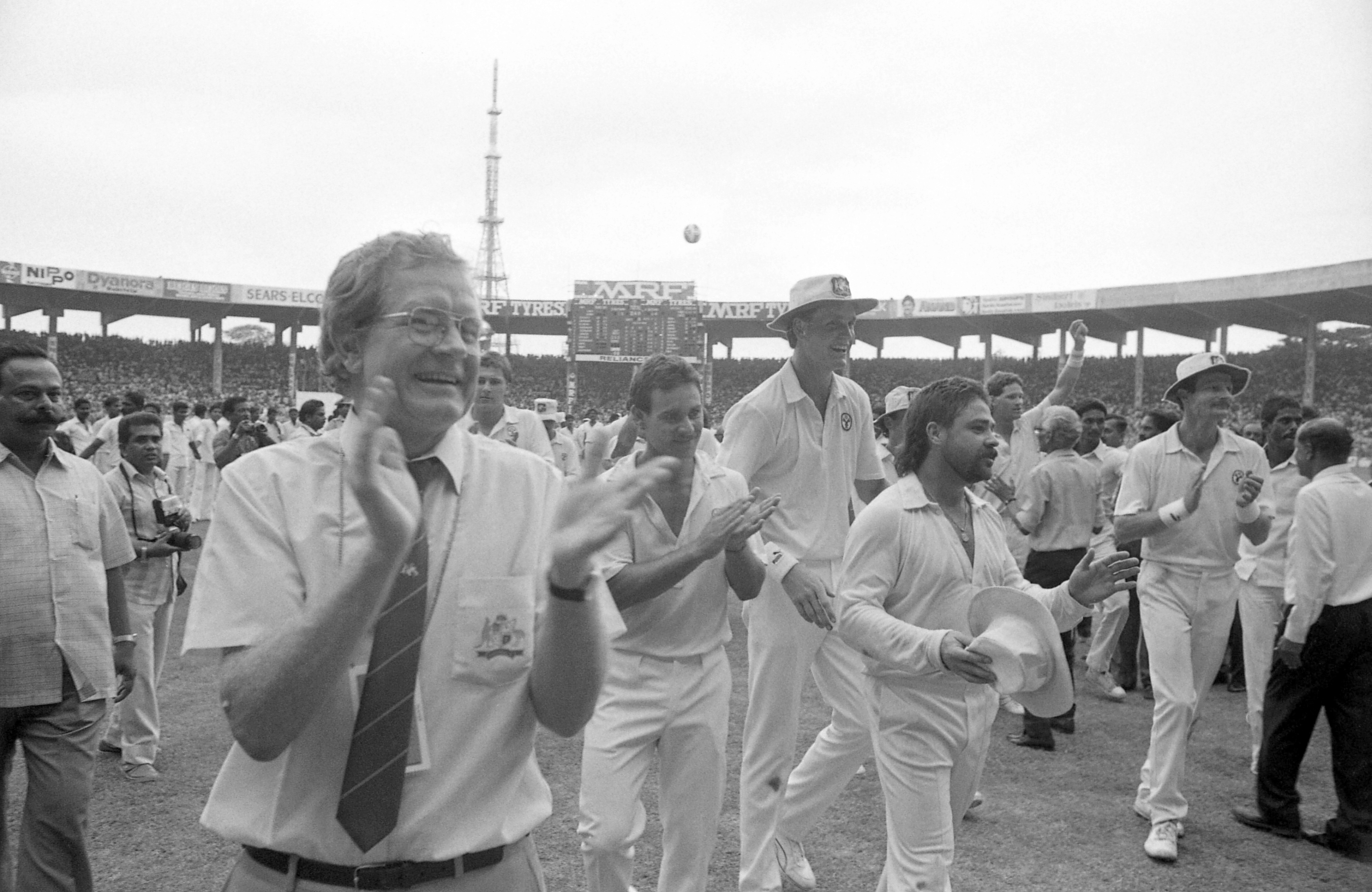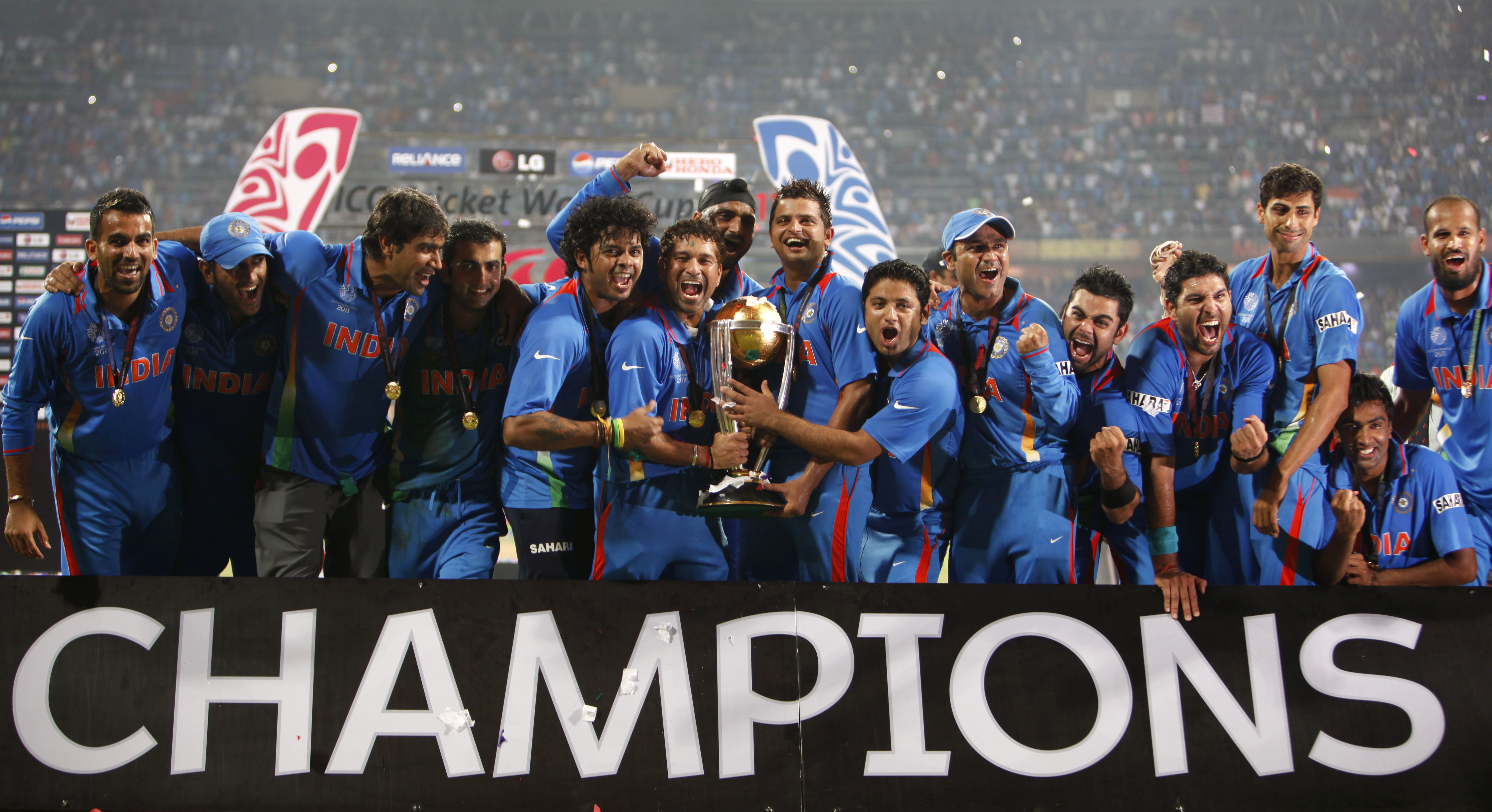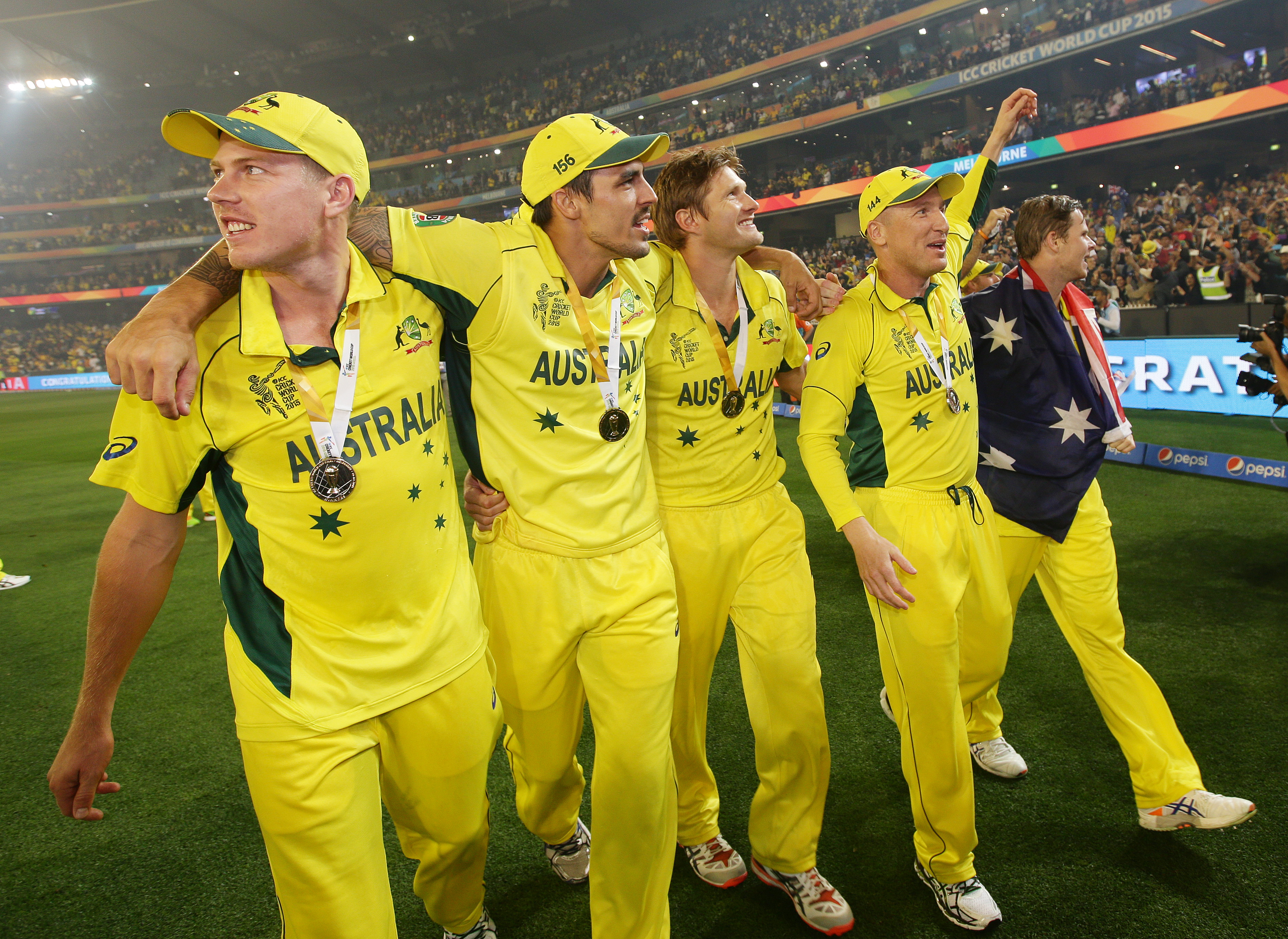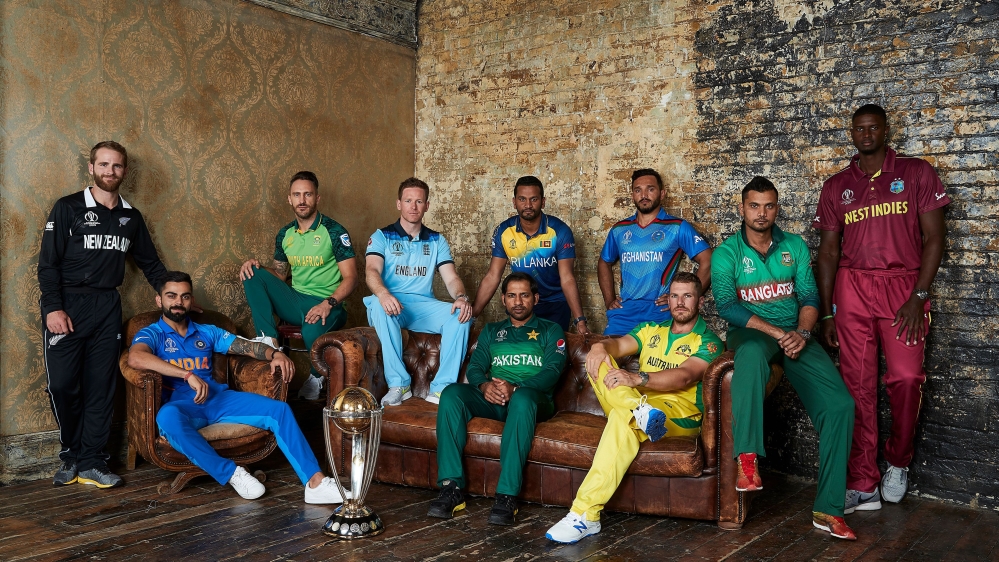
The International Cricket Council (ICC) Men’s Cricket World Cup has witnessed evolving formats, stiff competition, and tense controversies over nearly five decades.
The 13th edition of the tournament, being hosted by two-time winners India, will be held from October 5 to November 19 and will see 10 teams vie for the one-day international (ODI) cricket’s most coveted trophy.
Here is a look back at the tournament’s 47-year history.
Humble beginnings
The ICC was founded in 1909, with England, Australia, and South Africa as the only members. The three countries played a Test cricket tournament in 1912, but poor weather conditions in England and a lack of public interest meant the competition did not happen again.
Teams around the world continued to play bilaterally until the ODI format gained popularity in the 1960s, following its introduction in English county cricket.
The first Cricket World Cup of any kind was a women’s tournament organised in 1973 by the International Women’s Cricket Council, which later merged with the ICC.
1975
Hosts: England
Winners: West Indies
As the only country with enough resources to host the event, England eventually organised the first Men’s Cricket World Cup in 1975 with eight teams in the competition and the ODI format in its fifth year.
The six Test-playing nations at the time – Australia, England, India, New Zealand, Pakistan and the West Indies – were joined by Sri Lanka and a composite team from East Africa.
South Africa, one of the strongest teams in world cricket, were serving a ban from international cricket over the country’s apartheid-era policies.
The tournament was played in white kits, with red balls and in a 60-overs-a-side format.
The West Indies defeated Australia by 17 runs to win the trophy in the final at Lord’s.
Amid the celebrations, which saw fans pour down to the field, a pitch invader stole famous British umpire Dickie Bird’s hat.

1979
Hosts: England
Winners: West Indies
Based on the success of the inaugural competition, the World Cup became a recurring event on the international cricket calendar and was mooted to be held every four years.
The competition stayed in England, who made it to the final but lost to the defending champions West Indies by 92 runs.
England’s leading bowler Bob Willis missed the final match due to an injury that he suffered in the semifinal. Star West Indies batter Viv Richards was awarded man of the match for his 138 runs from 157 balls.

1983
Hosts: England
Winners: India
Breaking the West Indies’ shot at treble, India’s 1983 World Cup win made them a force to be reckoned with and their captain Kapil Dev a household name in his country.
In what is considered an iconic moment in the tournament’s history, Kapil Dev ran backwards to complete a catch that saw Richards dismissed for 33 as India completed a 43-run win.
In a famous statement, David Frith, then-editor of Wisden Cricket Monthly, said: “Show me a person who gave Kapil Dev’s team any chance of winning the 1983 World Cup and I will show you a liar and an opportunist.”
The Indian team’s 1983 World Cup win became a famous underdogs story and was depicted in the 2021 Bollywood film titled 83.

1987 World Cup
Hosts: India and Pakistan
Winners: Australia
For the first time, the tournament was held outside England as it switched to a 50-over format to adjust to fewer daylight hours in the Indian subcontinent.
After having three tournaments with all-English umpires, this World Cup was the first to feature neutral umpires.
Australia and England faced off in one of the closest World Cup finals at the famous Eden Gardens stadium in Kolkata, then known as Calcutta, after defeating co-hosts Pakistan and India in their respective semifinals.
Australia beat England by seven runs and David Boon was named player of the match for his 75 runs.
Pretournament favourites West Indies did not advance past the group stage.

1992 World Cup
Hosts: Australia and New Zealand
Winners: Pakistan
As the tournament returned after five years and moved Down Under for the first time, it brought several changes: coloured kits, white balls and day-night matches played under floodlights.
It was also the first World Cup to include television replays and the use of a third umpire to adjudicate run-out appeals.
With the end of apartheid, South Africa returned to international cricket and were included in the tournament for the first time, increasing the number of teams to nine.
They advanced to a memorable semifinal, where a controversial “rain rule” left them needing 22 runs off one ball when play resumed after a rain delay.
In a defining moment for Pakistani cricket, Imran Khan led his team of self-styled “cornered tigers” to a 22-run victory over England.

1996 World Cup
Hosts: India, Pakistan and Sri Lanka
Winners: Sri Lanka
Sri Lanka joined second-time organisers India and Pakistan as co-hosts in the midst of a civil war in the island nation.
The tournament was hit by a controversy before it began, as several countries refused to play in Sri Lanka.
Australia and West Indies forfeited their matches in Colombo after a bombing at the Central Bank of Sri Lanka in the capital three weeks before the tournament. The ICC then awarded two points to Sri Lanka, who became the first team to qualify for the quarterfinals.
Controversies continued to plague the tournament. An unruly crowd in Kolkota disrupted India’s semifinal against Sri Lanka when the hosts lost their eighth wicket. Meanwhile, Pakistani cricketer Wasim Akram’s house in Lahore was stoned by an angry mob after he pulled out of Pakistan’s quarterfinal against India citing an injury.
In the final at Lahore’s Gaddafi Stadium, Sri Lanka’s Aravinda De Silva and captain Arjuna Ranatunga guided the team home in a chase of 242 against Australia and brought their first World Cup title.

1999 World Cup
Hosts: England
Winners: Australia
The World Cup returned to England after a 16-year hiatus and was held a year early to avoid a clash with the 2000 Olympic Games in Sydney.
The number of teams increased to 12, with Zimbabwe, Bangladesh, Kenya, and Scotland joining the lineup.
Pretournament favourites Australia and Pakistan met in the final, which turned out to be a one-sided match after Pakistan were bowled out for 132 runs, setting off Australia’s treble run in the tournament.

2003 World Cup
Hosts: South Africa
Winners: Australia
The first World Cup to be held on the African continent saw star Indian batter Sachin Tendulkar shine with 673 runs, and Australia play without legendary spinner Shane Warne as he served a ban after testing positive for a prohibited drug.
Australia beat India by 125 runs in the final in Johannesburg.

2007 World Cup
Hosts: West Indies
Winners: Australia
It was a World Cup beset by controversy, tragedy and upsets.
Pakistan’s South African coach Bob Woolmer was found dead in his hotel room a day after his side’s shocking three-wicket loss to Ireland in the group stage.
Following Woolmer’s death, organisers imposed restrictions on music and celebrations in the stands.
Bangladesh shocked India by beating them by five wickets in the group stage. India and Pakistan failed to progress to the Super Eight stage.
Australia continued their golden run in the tournament and bagged their fourth title after beating Sri Lanka by 53 runs.

2011 World Cup
Hosts: India, Bangladesh and Sri Lanka
Winners: India
India became the first team to win the World Cup on home soil after beating Sri Lanka in the final by six wickets in the first all-Asian final.
Australia’s 12-year reign came to an end with a quarterfinal loss to India, who went on to beat Pakistan in an enthralling semifinal in Mohali.
Pakistan lost hosting rights for the tournament due to security concerns after the Sri Lankan cricket team was attacked by armed men in Lahore on a 2009 tour.

2015 World Cup
Hosts: Australia and New Zealand
Winners: Australia
The two host nations faced off at the Melbourne Cricket Ground, with Australia eventually emerging as the victors in a one-sided final.
New Zealand’s Martin Guptill set a new world record for most runs in an ODI innings scoring 237 runs in the quarterfinal against the West Indies.

2019 World Cup
Hosts: England and Wales
Winners: England
In one of the greatest ODI matches in the game’s history, the last World Cup ended with a tied final match between England and New Zealand at Lord’s Cricket Ground.
The match went into a super over but that too ended in a tie and England were awarded the win based on the boundary countback rule.
In other milestones, Australia’s fast bowler Michael Starc claimed the most wickets in a competition with 27 dismissals.
The number of competing teams fell to 10.








